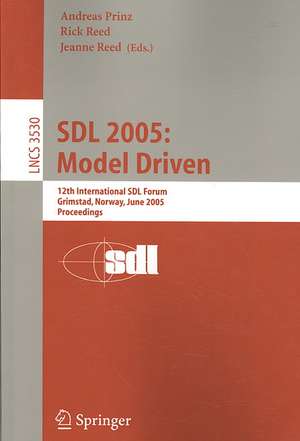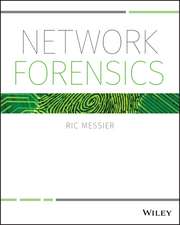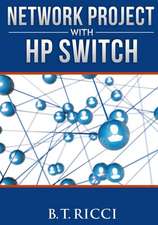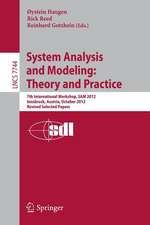SDL 2005: Model Driven: 12th International SDL Forum, Grimstad, Norway, June 20-23, 2005, Proceedings: Lecture Notes in Computer Science, cartea 3530
Editat de Andreas Prinz, Rick Reed, Jeanne Reeden Limba Engleză Paperback – 9 iun 2005
Din seria Lecture Notes in Computer Science
- 20%
 Preț: 1061.55 lei
Preț: 1061.55 lei - 20%
 Preț: 307.71 lei
Preț: 307.71 lei - 20%
 Preț: 438.69 lei
Preț: 438.69 lei - 20%
 Preț: 579.30 lei
Preț: 579.30 lei -
 Preț: 410.88 lei
Preț: 410.88 lei - 17%
 Preț: 427.22 lei
Preț: 427.22 lei - 20%
 Preț: 596.46 lei
Preț: 596.46 lei - 15%
 Preț: 448.04 lei
Preț: 448.04 lei - 20%
 Preț: 353.50 lei
Preț: 353.50 lei -
 Preț: 389.49 lei
Preț: 389.49 lei - 20%
 Preț: 309.90 lei
Preț: 309.90 lei - 20%
 Preț: 645.28 lei
Preț: 645.28 lei - 20%
 Preț: 763.23 lei
Preț: 763.23 lei - 15%
 Preț: 580.46 lei
Preț: 580.46 lei - 20%
 Preț: 310.28 lei
Preț: 310.28 lei - 20%
 Preț: 655.02 lei
Preț: 655.02 lei - 20%
 Preț: 1183.14 lei
Preț: 1183.14 lei - 20%
 Preț: 340.32 lei
Preț: 340.32 lei -
 Preț: 449.57 lei
Preț: 449.57 lei - 20%
 Preț: 591.51 lei
Preț: 591.51 lei - 18%
 Preț: 938.83 lei
Preț: 938.83 lei - 20%
 Preț: 337.00 lei
Preț: 337.00 lei - 20%
 Preț: 649.50 lei
Preț: 649.50 lei - 20%
 Preț: 607.40 lei
Preț: 607.40 lei - 20%
 Preț: 1414.79 lei
Preț: 1414.79 lei - 20%
 Preț: 1024.44 lei
Preț: 1024.44 lei - 20%
 Preț: 583.40 lei
Preț: 583.40 lei - 20%
 Preț: 453.32 lei
Preț: 453.32 lei - 20%
 Preț: 575.49 lei
Preț: 575.49 lei - 20%
 Preț: 1075.26 lei
Preț: 1075.26 lei - 20%
 Preț: 585.88 lei
Preț: 585.88 lei - 20%
 Preț: 825.93 lei
Preț: 825.93 lei - 17%
 Preț: 360.20 lei
Preț: 360.20 lei - 20%
 Preț: 763.23 lei
Preț: 763.23 lei - 20%
 Preț: 340.32 lei
Preț: 340.32 lei - 20%
 Preț: 504.58 lei
Preț: 504.58 lei - 20%
 Preț: 369.13 lei
Preț: 369.13 lei - 20%
 Preț: 580.93 lei
Preț: 580.93 lei - 20%
 Preț: 343.62 lei
Preț: 343.62 lei - 20%
 Preț: 350.21 lei
Preț: 350.21 lei - 20%
 Preț: 583.40 lei
Preț: 583.40 lei - 20%
 Preț: 583.40 lei
Preț: 583.40 lei - 15%
 Preț: 438.59 lei
Preț: 438.59 lei - 20%
 Preț: 341.95 lei
Preț: 341.95 lei - 20%
 Preț: 238.01 lei
Preț: 238.01 lei - 20%
 Preț: 538.30 lei
Preț: 538.30 lei
Preț: 336.54 lei
Preț vechi: 420.67 lei
-20% Nou
Puncte Express: 505
Preț estimativ în valută:
64.42€ • 69.100$ • 54.15£
64.42€ • 69.100$ • 54.15£
Carte tipărită la comandă
Livrare economică 22 aprilie-06 mai
Preluare comenzi: 021 569.72.76
Specificații
ISBN-13: 9783540266129
ISBN-10: 3540266127
Pagini: 380
Ilustrații: XII, 364 p.
Dimensiuni: 155 x 235 x 20 mm
Greutate: 0.53 kg
Ediția:2005
Editura: Springer Berlin, Heidelberg
Colecția Springer
Seriile Lecture Notes in Computer Science, Computer Communication Networks and Telecommunications
Locul publicării:Berlin, Heidelberg, Germany
ISBN-10: 3540266127
Pagini: 380
Ilustrații: XII, 364 p.
Dimensiuni: 155 x 235 x 20 mm
Greutate: 0.53 kg
Ediția:2005
Editura: Springer Berlin, Heidelberg
Colecția Springer
Seriile Lecture Notes in Computer Science, Computer Communication Networks and Telecommunications
Locul publicării:Berlin, Heidelberg, Germany
Public țintă
Professional/practitionerCuprins
Language Issues.- ULF-Ware – An Open Framework for Integrated Tools for ITU-T Languages.- An Access Control Language for Dynamic Systems – Model-Driven Development and Verification.- Non-deterministic Constructs in OCL – What Does any() Mean.- Engineering Issues.- Integrating RT-CORBA in SDL.- Component Development: MDA Based Transformation from eODL to CIDL.- Service Discovery and Component Reuse with Semantic Interfaces.- ns+SDL – The Network Simulator for SDL Systems.- Message Sequence Charts.- Semantics of Message Sequence Charts.- Compositional Semantics for UML 2.0 Sequence Diagrams Using Petri Nets.- Applications and Tools (Short Papers).- SDL Design of OSPF Protocol for the Wireless Private Network.- ASM and SDL Models of Geographic Routing in Mobile Ad Hoc Networks.- Modeling Route Change in Soft-State Signaling Protocols Using SDL: A Case of RSVP.- Experiences in Using SDL to Support the Design and Implementation of a Logical Link Layer Protocol.- Modeling, Verifying and Testing Mobility Protocol from SDL Language.- Cinderella SLIPPER: An SDL to C-Code Generator.- Model Driven Architecture (Short Papers).- Model-Driven Development of Reactive Systems with SDL.- A UML-Compatible Formal Language for System Architecture Description.- Test and Validation.- UCM-Driven Testing of Web Applications.- Network Element Testing Using TTCN-3: Benefits and Comparison.- A Compositional Approach to Service Validation.- Consistency Checking of Concurrent Models for Scenario-Based Specifications.- Code Generation.- SDL Code Generation for Open Systems.- SDL Versus C Equivalence Checking.- Synthesizing State-Machine Behaviour from UML Collaborations and Use Case Maps.




















